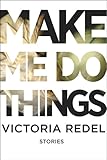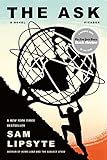
Unlike movie Mafioso Michael Corleone from Francis Ford Coppola’s classic film The Godfather, who menacingly intones, “Don’t ask me about my business,” the Manhattan-based author Victoria Redel actually seems to enjoy answering questions about her work, which often takes the form of fiction addressing an intense — even boundary-violating — bond between a parent and child. But don’t ask her about her personal life.
 Following the 2001 release of her novel Loverboy, about a mother so enmeshed with her young son that she decides to asphyxiate him in a car rather than let him go to school, Redel has found herself explaining to readers that her creation of unlikable, even destructive characters is neither a window — nor an invitation — into her psyche.
Following the 2001 release of her novel Loverboy, about a mother so enmeshed with her young son that she decides to asphyxiate him in a car rather than let him go to school, Redel has found herself explaining to readers that her creation of unlikable, even destructive characters is neither a window — nor an invitation — into her psyche.
“I do really strongly believe that to spend time examining a writer’s work for insights into her private life is missing the mark,” she wrote to The Millions recently about the media impulse to dig for dirt when a woman produces a chilling book. Still, 13 years after the publication of Loverboy, adapted in 2006 into a movie by the same name that starred Kevin Bacon, she continues, she admits, to field public concern. “At readings, there’s always someone who raises their hand and asks, ‘Do you have children?'” (Redel, 54, has two grown sons from her former marriage: Jonah, 25, and Gabriel, 21.) “I began to say, ‘Yes,’ she adds, ‘but I don’t have a garage.'”
 Gallows humor aside, the issue of how adults in Redel’s fiction respond to children has reemerged following the recent publication of her intriguing short story collection Make Me Do Things. The compulsion suggested by the title reflects the tendency of many of her characters to lurch toward problematic, even dangerous choices. Such figures include: a married mom having an affair with a man who becomes obsessed with her young daughter; a father fantasizing about raping his wife in front of their preschool-age son; and a pregnant couple losing hold of reality and descending into drug addiction.
Gallows humor aside, the issue of how adults in Redel’s fiction respond to children has reemerged following the recent publication of her intriguing short story collection Make Me Do Things. The compulsion suggested by the title reflects the tendency of many of her characters to lurch toward problematic, even dangerous choices. Such figures include: a married mom having an affair with a man who becomes obsessed with her young daughter; a father fantasizing about raping his wife in front of their preschool-age son; and a pregnant couple losing hold of reality and descending into drug addiction.
Rather than metaphors for bad parenting, the stories are, to Redel’s mind, merely reflective of human nature. Of the story “On Earth,” featuring the mother who steps beyond the safe pale of her family to take on an unbalanced lover, Redel said, “She loves her kid, and she loves her husband, and yet she does this inexplicably wrong thing.” The tale functions as a reminder, she adds, that “even in the best of circumstances, we can screw up.”
Either way, fiction is fiction, so why, beyond their highly effective and gothic nature, do Redel’s tales so disturb some? Is it true, as novelist Claire Messud complained last year to Publishers Weekly, that we unfairly expect female protagonists — or characters written by women — to be uniformly sympathetic?
Could be. But novelist and short story writer Elisa Albert floats a different theory: that we tend to confuse child-rearing with maturity. We’re mistaken, she believes, when we assume becoming a parent — she herself has a five-year-old son — automatically flips on a wisdom switch, and we bring that misguided notion to our reading of literature.
It’s absurd, Albert, the 35-year-old author of How This Night is Different and The book of Dahlia, adds by email, “this idea that when you become a mother your sexual and creative judgment somehow magically improves,” and that — thanks to your new role — “all the childish yearnings and poor object choices suddenly evaporate. Every honest woman/mother I know struggles with this mythology. Redel illuminates it nicely.”
But given the dark quotient to some of Redel’s writing, how does her own family respond? “They’ve been very kind,” she said, but adds that they’ve been jarred by her blurring lines between the professional and private. Raised in Scarsdale as the youngest of three daughters of refugees from Hitler’s Europe — one, a religious Jew from Belgium; the other, a ballerina from Rumania — she’s sometimes seeded facts from their lives into her work. One of her older tales treats a daughter’s resentment of her mother’s bum leg, which Redel calls “a manifestation of the [same] illness my mother had,” before she died. Reading it, her father became worried about a possible connection.
Of personally feeling the daughter’s pique, Redel said, “That never happened.” Nevertheless, upset, her father “called my sister — my middle sister, Jessica — and he said, ‘That’s not Mom.'” She replied, “‘No, that’s not Mom,’ adding, ‘This is a story.'”
Her father, who’s 90, remarried, and still observant, does, indeed, grasp the difference between fact and fantasy. But seeing a facet of a loved one rendered in fiction can be hard. To spare him, Redel’s sister told him: “‘Close the book; don’t read further.”

 Effectively shrugging his cyber-shoulders at excess sensitivity, Sam Lipsyte, 45, author of the satirical novel The Ask and the short-story collection The Fun Parts, told The Millions via email that, as an author, Redel’s “got the chops to make real art” from disdaining popular notions of “what children and adults are supposed to think and feel.”
Effectively shrugging his cyber-shoulders at excess sensitivity, Sam Lipsyte, 45, author of the satirical novel The Ask and the short-story collection The Fun Parts, told The Millions via email that, as an author, Redel’s “got the chops to make real art” from disdaining popular notions of “what children and adults are supposed to think and feel.”
Drawing a connecting line from TV commercials to treacly group-think to reactions to gothic literature, Lipsyte adds: “Right now everything that doesn’t resemble a Cheerios television ad disturbs some people. It’s not just that she writes about dark things — often [Redel’s] work is about capturing the logic of our emotions and celebrating the exquisitely felt.”
But for some — even Redel, who, Lipsyte said, creates “intense, poetic prose” — the ability to shrug off the sensitivities of others may be less automatic, her eerie tales notwithstanding. Indeed, she remains “interested in what kind of redemption is possible.”
Perhaps that’s why she’s currently at work on a novel with a premise that sounds almost bizarrely Oprah-esque. “Some of it has to do with a woman who’s trying to pick up the pieces,” Redel said, one who, “despite her compete doubt in any such thing, believes she’s being aided by a bumbling uncle who has passed away.”
Suddenly, the author of the spine-chilling reemerges. It’s “a novel,” she said, “about middle age.”
Image Credit: Wikipedia









